The cost of living crisis was a significant driving force in the June election, while gender equality had minimal impact on people’s voting preferences, according to a report by the European Parliament.
The rising cost of living was a key factor driving people to the polls in June’s European Parliament elections, with 42% of voters citing it as an important issue, according to a Eurobarometer survey.
The precarious international situation also significantly influenced voters’ candidate choices, followed closely by concerns about democracy and the rule of law.
Less than a third of voters viewed migration as a primary issue, with similar results for climate change.
Gender equality and the digitalisation of Europe’s economy and society were the least influential factors, the report showed, impacting only 7% and 6% of voters, respectively.
Young generations snub voting, yet favour EU
At 51%, the 2024 EU election turnout was higher compared to the 2019 turnout of 50.7% and the 2014 turnout of 42.6%.
Voter participation was highest among those over 55 (58%), while the 15–24 age group had the highest abstention rate at 64%.
Despite this, majority of the youngest voters view EU membership positively, with 71% of them saying their country has benefited from being part of it.
The 2024 EU election saw a turnout of 51%, marking an increase from both
Among social groups, the unemployed had the highest abstention rate (71%), whereas managers showed the highest participation at 63%.
The report further details the reasons behind the nearly 50% voter abstention in the European elections. The main factors were a lack of trust in politics (21%) and a general lack of interest (20%).
Other notable reasons included being on holiday or away from home (12%), “too busy” or at work (12%).
Video editor • Mert Can Yilmaz
Read the full article here

















